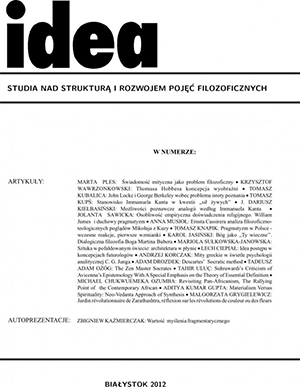Sens dziejów i kenoza w myśli Augusta Cieszkowskiego i Włodzimierza Sołowjowa
The sense of history and kenosis in August Cieszkowski’s and Vladimir Solovyov’s thought
Author(s): Michał SikoraSubject(s): Christian Theology and Religion, Philosophy, Metaphysics, Theology and Religion
Published by: Wydawnictwo Uniwersytetu w Białymstoku
Keywords: Cieszkowski; Solovyov; Christian mysticism; Hegel’s philosophy; Sołowjow; mistycyzm chrześcijański; filozofia Hegla
Summary/Abstract: August Cieszkowski was one of the brilliant Polish thinkers of the nineteenth century, who combined Hegel’s philosophy with Christian mysticism. The main subject of this text is a presentation of the role of kenosis in a historical perspective and the category of future, which means the union of humanity, end of time and creating The Common’s Church. Additionally, I am going to show the relation between Cieszkowski’s and Vladimir Solovyov’s philosophy (especially the theory of Godmanhood). Both views are similar and search, in their criticism of Hegel’s system, for a way to messianistical redemption. The purpose of the comparison is to indicate the similarities in the philosophy of August Cieszkowski and Vladimir Solovyov, relating to the problem of a sense of history and kenosis.
Journal: Idea. Studia nad strukturą i rozwojem pojęć filozoficznych
- Issue Year: 2/2015
- Issue No: XXVII
- Page Range: 139-157
- Page Count: 19
- Language: Polish

